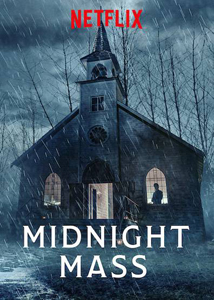I’m an atheist guided by facts and a solid moral upbringing rather than faith, but one thing about religion makes me jealous: the beautiful traditions. Whether it’s ceremonies, scripture quotes or communal gatherings, we atheists can’t compete.
The draw of the church
Early in Mike Flanagan’s latest horror miniseries, “Midnight Mass” (Netflix), we see wholesome masses and community picnics on the hardscrabble, fishing-oriented Crockett Island.
There’s bigotry from church assistant Bev (Samantha Sloyan in a sharp portrayal of everyday evil) toward the Muslim sheriff (Rohul Kohli). Yet we understand why the sheriff’s son (Rahul Abburi) desires to attend this Christian church.
“Midnight Mass” (2021)
Netflix, 7 episodes
Creator: Mike Flanagan
Stars: Zach Gilford, Kate Siegel, Hamish Linklater
Sure, it’s partly because the only nice girl his age on the island (Annarah Cymone as Leeza) has invited him. But it’s more than that.
“Midnight Mass” ultimately gives non-religious people a little of that sense of belonging. Tapping into a Carl Sagan vibe, Flanagan (who directs and co-writes all seven episodes) writes gorgeous monologs and dialogs about life and death – thoughts that are on everyone’s mind once people start to go missing.
(SPOILERS FOLLOW.)
Pontificating on death
A highlight comes in the middle episode, “Lamentations.” Lifelong friends and potential lovebirds Riley (“Friday Night Lights’ ” Zach Gilford) and Erin (Flanagan staple Kate Siegel) give atheist and theist theories about what happens when we die.
It’s interesting that Riley’s take on death is biological yet deeply poignant. He imagines one last dream – a last downloading of information – upon death.
Riley and Erin represent how consistently bittersweet this series is, with hope and tragedy always competing. Riley killed someone while drunken driving (he has returned home after his prison stint), and Erin has recently had a miscarriage.
Now, take my bias for what it’s worth. But I think Flanagan smoothly balances theism and atheism to create a series that merges and transcends the two. That’s the sunny side.
A vampire story (even if no one admits it)
The darker – possibly offensive to some, definitely daring – side of “Midnight Mass” comes from how it parallels the Jesus story with vampire lore. Via Bev and Monsignor Paul (Hamish Linklater), the writers interpret scripture as grimly as possible every time. The Old Testament is not off limits.
It’s fascinating to watch the Crockett Island churchgoers gradually be swayed. This is a fair portrayal of how any group (religious or otherwise) can be convinced that wrong is right.
It leads to “Midnight Mass’ ” striking showpiece in episode six, “Act of the Apostles,” where The Angel (Quinton Boisclair) appears at the grand finale of the monsignor’s string of ceremonies. Everyone is poisoned and revived thanks to the communion blood they’ve been unknowingly drinking leading up to Easter.
“Midnight Mass” can be nitpicked. Sheriff Hassan should perhaps investigate the island’s many abandoned houses (the population has dropped from hundreds to dozens, we’re told), rather than simply writing up reports for each new missing person. And the way Bev’s arrogance ruins the congregation’s plans at the end is convenient.

Also, here’s an oddity: “Midnight Mass” takes place in a world where pop culture exists — Riley’s childhood room has posters of “Seven” and “Scream” – yet vampire lore does not. When the town skeptics, fronted by Annabeth Gish’s doctor Sarah, do their Stephen King miniseries-esque thing of mulling how to fight the scourge, they never make vampire parallels.
Taking advantage of the form
Viewers will, though. As a “Buffy”/ “Angel” fan, I couldn’t help but think of “Amends,” “Reunion” and “Chosen” when similar situations happen here. These comparisons show the difference between turn-of-the-century network shows and modern streaming shows.
In the latter, true horror is allowed, something Flanagan also took advantage of in “The Haunting of Hill House” (2018) and “The Haunting of Bly Manor” (2020). Remember the ghost in the backseat in “Hill House?” “Mass” has a jump scare in episode three that competes with it.
What’s more: We reach for the Kleenex even while being horrified. The canoe jaunt that closes episode five earns Erin screaming over the closing credits. At the same time, it marks an end to Riley’s arc that’s tear-jerking in its tastefulness. He goes to Heaven because he was a good person.
I rank “Mass” slightly below “Hill House” among Flanagan’s miniseries. For one thing, the latter invented the idea of sticking ghosts in the backgrounds of scenes, and “Mass” doesn’t follow through with the chance to use glowing yellow eyes in the same fashion (with a notable early exception on a nearby cat-infested island, a great setting that doesn’t return).
Great actors on board
On the other hand, unlike the two “Hauntings,” this one is an original work – refreshing in this day and age. While the plot and specific beats draw on religious and vampire traditions, it is quite original to achieve a deep piece of horror wherein there’s only one evil human (Bev) and one monster (which is arguably neutral, doing what it does).
The actors sink their teeth into the teleplays. Linklater pulls off the neatest trick as a priest who murders the whole town, yet he’s sympathetic. Pruitt believes in what he’s doing, he explains himself and the circumstances, and he ultimately does recognize the line between right and wrong.
Gilford makes me wonder how he hasn’t had more major roles since “FNL.” The versatile Siegel has a nicely homey presence. The warmth exuded by Kohli is refreshing for a law-enforcement figure. Robert Longstreet plays one of the most lovable drunks ever. And I’ve never seen Henry Thomas and Kristin Lehman – as Riley’s parents – quite like they are here.
Flanagan’s horror bona fides are evident in the shocking or grand moments, at least one of which is found in each episode. But he always puts work ahead of play. It’s only when we care for the people of Crockett Island that he starts to terrify them – and therefore us.

